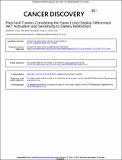Pten-Null Tumors Cohabiting the Same Lung Display Differential AKT Activation and Sensitivity to Dietary Restriction
Author(s)
Curry, Natasha L.; Mino-Kenudson, Mari; Oliver, Trudy; Yilmaz, Omer; Yilmaz, Vedat O.; Moon, Jade Y.; Jacks, Tyler E.; Sabatini, David M.; Kalaany, Nada Y.; ... Show more Show less
DownloadJacks_Pten-null tumors.pdf (10.47Mb)
OPEN_ACCESS_POLICY
Open Access Policy
Creative Commons Attribution-Noncommercial-Share Alike
Terms of use
Metadata
Show full item recordAbstract
PTEN loss is considered a biomarker for activated phosphoinositide 3-kinase (PI3K)/AKT, a pathway frequently mutated in cancer, and was recently shown to confer resistance to dietary restriction. Here, we show that Pten loss is not sufficient to drive AKT activation and resistance to dietary restriction in tumors with low growth factor receptor levels. We describe a murine Pten-null Kras-driven lung cancer model that harbors both dietary restriction–resistant, higher-grade, bronchiolar tumors with high AKT activity, and dietary restriction–sensitive, lower-grade, alveolar tumors with low AKT activity. We find that this phenotype is cell autonomous and that normal bronchiolar cells express higher levels of insulin-like growth factor-I receptor (IGF-IR) and of ectonucleoside triphosphate diphosphohydrolase 5 (ENTPD5), an endoplasmic reticulum enzyme known to modulate growth factor receptor levels. Suppression of ENTPD5 is sufficient to decrease IGF-IR levels and sensitize bronchiolar tumor cells to serum in vitro and to dietary restriction in vivo. Furthermore, we find that a significant percentage of human non–small cell lung carcinomas (NSCLC) have low AKT activity despite PTEN loss. SIGNIFICANCE: Our studies point to a heterogeneity of AKT activation in the same murine Pten-null lung tissue and in human NSCLC, further underscoring the challenges of personalizing cancer therapy based solely on cancer genotype. Our findings therefore indicate that the tumor response to anticancer therapies, including dietary restriction, needs to be based on PI3K/AKT activity per se, rather than on genetic alterations in the PTEN/PI3K pathway.
Date issued
2013-05Department
Massachusetts Institute of Technology. Department of Biology; Whitehead Institute for Biomedical Research; Koch Institute for Integrative Cancer Research at MITJournal
Cancer Discovery
Publisher
American Association for Cancer Research
Citation
Curry, N. L., M. Mino-Kenudson, T. G. Oliver, O. H. Yilmaz, V. O. Yilmaz, J. Y. Moon, T. Jacks, D. M. Sabatini, and N. Y. Kalaany. “Pten-Null Tumors Cohabiting the Same Lung Display Differential AKT Activation and Sensitivity to Dietary Restriction.” Cancer Discovery 3, no. 8 (August 7, 2013): 908-921.
Version: Author's final manuscript
ISSN
2159-8274
2159-8290